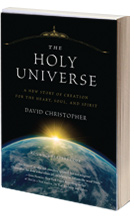The Holy Universe Call-in Book Club

.
The Holy Universe Call-in Book Club is a chance for you to converse and dialogue with me and your fellow readers of The Holy Universe. We’ll dive deeper into the writings and ideas in the book, dialogue about them amongst one another, and have a chance to ask questions that participants have about the book.
The Book Club meets approximately every six weeks. Each session will cover one chapter of The Holy Universe; I’ll open the calls with a reading and some initial thoughts. Then we’ll break into small groups for dialogue around specific questions and then gather again in the larger group for further dialogue and questions and answers.
Between calls, you’re also invited to stay connected in support of our work for sustainability, social justice and spiritual fulfillment via the Facebook group for club participants. You can Join the Facebook group now, if you wish.
So please come meet some of your fellow Seekers and kindred spirits; my hope is that you’ll have another source of support as you find and fulfill your role in this Great Transformation we’re in the midst of.
.
“Drop-ins” Welcome and Registration
The book club is a “drop-in” event; that is, it’s not a requirement that you have attended any previous meetings. So please join us for the next meeting, which will be announced soon for the end of October/beginning of November.
Please sign up for the newsletter for details about the next meeting, which will be on Wednesday, January 14th. You can also send an email to us letting us know of your interest.
.
Questions for the September 30 2014 Session:
The Gospel of the Universe
(Note: these questions only appear out of order; the numbers pick up from previous sessions.)
5.* The Sage points out to the Seeker that he’s thrown away the stories he was given as a child, but can’t reconcile with the “Big Dumb Rock” story. The Seeker exclaims in response, “I don’t have a story!” to which the Sage replies, “Well, you do have a story, but ‘There’s got to be a better story than this’ is hardly a foundation for a fulfilling life.” At what times in your life, if ever, did you not have a clear overarching story? When, if ever, was your story seriously challenged, even changed? What happened to challenge and change your story? (p. 36)
6. Even though it is based on science, the story of creation that the Sage begins with has parallels to other creation stories (e.g., Genesis). What similarities did you see in relation to these other stories that you are familiar with? What differences did you notice? How well do you feel the “poetic” structure works? How well does this structure enhance a science-based narrative? (p. 41)
7. What other parallels and differences between this creation story and others that you are familiar with did you notice in the two sections entitled “The Seven Creations” and “The Grandmother Star and the Creation of Earth”? Were there any sections of this narrative that you found surprising or intriguing? (pp. 44–54)
8.* The Sage uses the terms “Infinite” and “the creative force of the Infinite” to describe her idea of ultimate reality. What words do you use to describe this ultimate reality? What do you believe are its characteristics? (p. 56)
.
Join the Book Club’s Facebook page
.
Questions for the July 29 2014 Session:
Preface
1. When the Seeker meets the Sage at the café, he recounts how his concerns go beyond losing his job; he reveals deeper concerns about finding meaningful work in a world from which he feels estranged and disconnected. How much of a struggle has this been in your life? Have you been able to find meaningful work? (p. 10)
2. To learn about the importance of story, the Seeker, at the Sage’s suggestion, throws a birthday party for a friend. How does your experience with celebrations compare with the Seeker’s celebration? When have stories been a part of the celebrations you’ve attended? Do you agree that adding stories helps celebrations? How might you incorporate stories into your celebrations? (p 16)
3. In discussing story and celebrations, the Sage says, “But notice how we shout ‘Speech! Speech!’ as we honor cherished ones at a celebration . . . but their words seldom satisfy.” What has happened when you’ve heard people shout out for a speech at a celebration? When have you seen someone handle this request well, and share meaningful words? What did they say, and why did it work? (p. 25)
4. The Sage asserts that “we are the stories we tell ourselves—a person cannot exist without a story.” Do you agree with this? Why or why not? In what situations might a person lose his or her story? (p. 26)

 “Better books for a better world, books that inspire and connect our lives as individuals, communities, and global citizens.”
“Better books for a better world, books that inspire and connect our lives as individuals, communities, and global citizens.”
 Click here to learn more about ordering a copy of The Holy Universe.
Click here to learn more about ordering a copy of The Holy Universe.